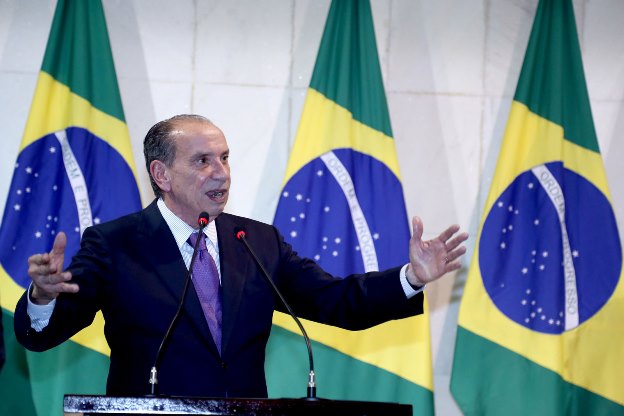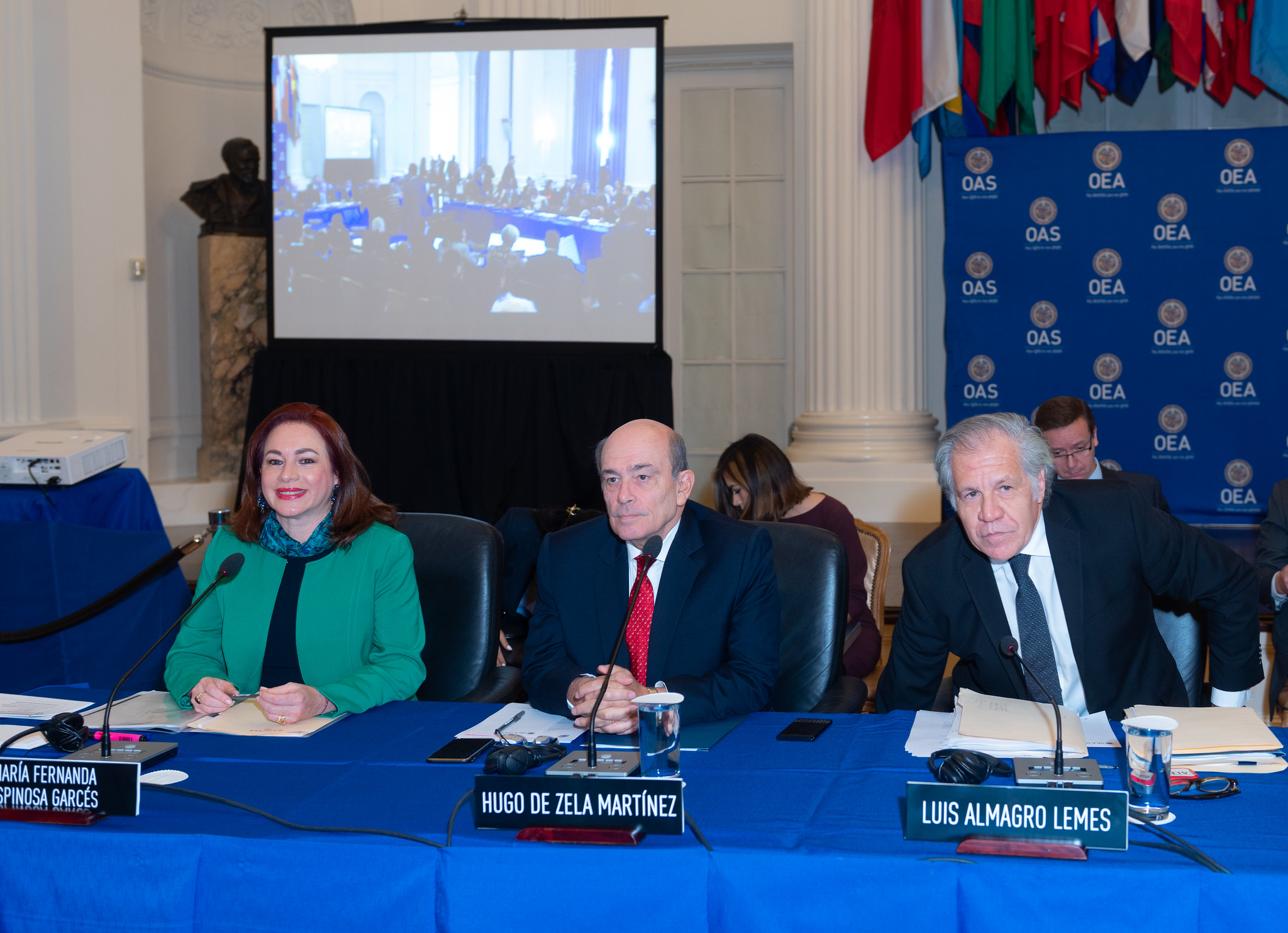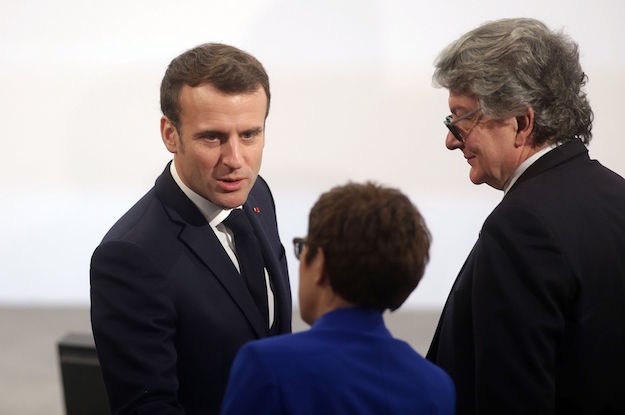Latin America faces many challenges to ensure a better life for its citizens. The best tool to tackle such challenges is improving democratic governance, which does not always find fertile ground to thrive. The main obstacle to democratic governance continues to be populist politicians and their shaky commitment to democracy. The making of a democratic and prosperous Latin America requires dispelling the cheap illusions sold by populist politicians in order to build strong institutions and a secure path to development and prosperity.
Most political scientists would agree there’s no one-size-fits-all definition of populism. A bottom-line description would probably associate populism with the attempt of unscrupulous leaders at garnering public support through the adoption of measures that might have appeal to the masses while profoundly damaging to the state of public finances and to the rule of law. In the trade-off between good governance and the quest for cheap public applause, the populist leader will always choose the latter.
Populists sell illusions that quickly dissolve into thin air, leaving behind a long trail of economic stagnation, social despair, and political cronyism. Even though the promise of populism is to deliver a better life, in practice its means usually erode the proclaimed objectives, and the promise is broken time and again by profligate public spending, fiscal irresponsibility, inflationary measures, and corruption. Populism has a penchant for finding scapegoats as a strategy to exempt itself from its own failures, in a blame-shifting gimmick directed against foreigners, the elite, the international economy, big corporations or the occasional “imperialist” bogeyman.
Populism might as well be considered the nemesis of democratic governance. While the former is based on artificial ideological assumptions as shortcuts to an unachievable future, usually underpinned by the charisma of the leader, the latter highlights the importance of choosing the sensible means to attain the best possible objectives and being accountable to the public. Democratic leaders know that the road to economic growth, prosperity, and social inclusion is anything but easy: it’s long, winding, and bumpy. It requires long-term planning, hard work, difficult choices, and respect for democratic rules every step of the way.
In the first half of the 20th century, the virus of populism spread rapidly throughout Latin America. No country was totally immune to it, as the direct appeal to the masses and demagoguery became the name of the game, usually followed by lavish resources being poured into popular projects and government propaganda. It’s no coincidence that the most recent wave of populism in our part of the world overlapped almost perfectly with the last cycle of high commodity prices and its attendant surge in discretionary government spending.
Although populism has become a defining feature of left-leaning governments in the region, it has no ideological boundaries, afflicting left and right alike. Populism hijacks ideology for the sake of perpetuating a ruler and his clique in power. Our brotherly nation of Venezuela is the perfect example. As Chairman of Brazil’s Senate Foreign Relations Committee, I had the opportunity of witnessing firsthand, however briefly, the extent to which the regime has lost touch with its people and with reality itself. In 2015, I was part of a mission of Brazilian legislators who travelled to Caracas with the goal of visiting with the regime’s political prisoners in order to ensure their basic rights were being respected and to press for their immediate release. Our delegation was met with violence and intimidation, and we were basically unable to leave the immediate vicinity of the airport. Populism is an acid that has been corroding the pillars of Venezuelan democratic institutions.
Nevertheless, over the last couple of years Latin Americans have shown their growing weariness of so-called charismatic leaders and their firebrand rhetoric. Social media and instant communication have brought about new ways to organize and voice collective grievances. It has become increasingly difficult for populist leaders to conceal reality behind a litany of lies and manipulated news. A more informed and much more demanding citizenry that knows more clearly what it wants – and especially what it no longer will tolerate – has blossomed all across Latin America. Most people are now concerned with their daily lives and are not liable to be lured by grandiloquent fabulations. Folks want governments to achieve down-to-earth goals: they want good schools, hospitals, and roads; they want jobs and public safety; they want their public services to work properly; they want their hard-won freedoms to be fully respected by the state.
Brazil and Argentina are just the most recent examples of countries that overcame populism, but there’s also reason for optimism elsewhere. As foreign minister, I have already visited many countries in the region committed to erasing the nefarious legacy of populism and strengthening democratic governance. Latin Americans have endured some variety of populism for far too long; now we want governments devoted to better public policies. Beyond the urgent need to recover from an era of fiscal irresponsibility and cooked public accounts, it’s critical to improve the quality of public services, getting the most value from public revenues.
Brazil is a huge country (the fifth largest in the world both in territory and population), endowed with a wealth of natural resources, a diversified economy, high-quality human capital, state-of-the-art agriculture, and world-class manufacturing industries. It is also mired in red tape, decaying infrastructure, and an arcane tax system, all of which contribute to raising the cost of doing business in the country and undermining its competitiveness. These liabilities were bequeathed among other things by a long history of populism that must be left behind once and for all.
Brazil’s current economic outlook is brighter than forecast just a few months ago. Present difficulties notwithstanding, the country has the ability to rise to the challenge and use the crisis as an opportunity to undertake much-needed political and economic reforms. President Michel Temer’s administration has been laying the groundwork for sustainable growth through a reform agenda that is designed to lead to a more efficient state and a more competitive economy: capping public spending, making the labor market more flexible, streamlining the pension system, tamping down inflation, creating a reliable business environment, inviting foreign investment, and restoring consumer confidence. These policies have proven to be the right track, as one may notice early signs of economic recovery, after the worst recession in decades.
In Brazil, an approach to public affairs is gradually taking shape and a consensus is being forged, one that puts a premium on the rule of law, enhanced democratic governance, fiscal responsibility, and a results-oriented attitude in public administration. That is the mandate that President Temer has been relentlessly pursuing since taking office.
—
This approach places foreign policy at the center of Brazil’s strategy of economic recovery and institutional modernization. The outside world should be seen as source of opportunities for the country to overcome ongoing challenges and difficulties. This might be a truism in other parts of the world, but not necessarily so in Brazil, still an essentially inward-looking country (not unlike other continent-sized nations) that has traditionally relied on its huge domestic market as the main driver for economic growth.
Foreign policy is an integral part of an ambitious agenda aimed at emboldening the systemic competitiveness of the Brazilian economy. There is a new awareness in Brazil about the need to increase exports, open its market for international trade on a reciprocal basis, and integrate Brazilian companies into the most dynamic global supply chains, especially through innovation. This may sound delirious in an era of resurging mercantilist rhetoric. In fact, that’s exactly why now is the right time for Latin America to show the way to the rest of the world, showcasing the virtues of free trade by striking new deals and doubling down on open regionalism.
This gives me an opportunity to say a thing or two about Mercosur. It is the utmost priority of President Temer to revitalize Mercosur and turn it again into a thriving customs union. Our main goal is to remove intra-bloc trade barriers, enable regulatory convergence, and engage in trade negotiations with key extra-regional partners. Furthermore, the members of the bloc are already exploring the adoption of a protocol on investment facilitation and another one on government procurement, both of which will further integrate our economies. It is also high on the bloc’s agenda to revamp our regional infrastructure: among other promising projects already in the pipeline, the modernization of the Paraná-Paraguay Waterway and building a bi-oceanic highway corridor between Brazil and Chile, intersecting Argentina and Paraguay, stand out as investments on the very future of trade and regional integration dynamism.
Extra-regional negotiations also merit close attention. The four original members of Mercosur are committed to expanding trade with our partners outside the region, not least with the European Union. I am hopeful that a free trade agreement between the two blocs, which has been under negotiation for almost two decades, will be concluded before the end of the year. The successful completion of such an FTA will not only spur business in Brazil and its Mercosur partners (as well as in 27 European nations), but it will also send a powerful message globally as to the enduring strength of trade as an engine for economic growth and prosperity.
On another front, the early talks between Mercosur and the European Free Trade Association (EFTA), comprised of Iceland, Liechtenstein, Norway, and Switzerland, got off to an excellent start. The same could be said about the ties being developed between Mercosur and the Pacific Alliance (Colombia, Chile, Peru, and Mexico), which I have little doubt will create a stronger and more united Latin America. The ministerial meeting between Mercosur and the Pacific Alliance, held in Buenos Aires on April 7, 2017, was a watershed and demonstrated what can be achieved by responsible governments working together to the benefit of their people.
Although a free trade agreement between Mercosur and the United States remains unlikely in the short term, it does not mean that important bilateral initiatives between Brasília and Washington, undergirded by a strong economic foundation, should not be pursued. After all, the two largest countries in the Americas share a great deal in common in terms of history, culture and society, and should work together to build a mutually beneficial agenda that prioritizes the many issues we converge on over the few on which we might not.
Trade and investments are already a huge part of the relationship, but there’s room for improvement. The Temer administration is eager to find ways to work side by side with the U.S. government and to enhance our business and people-to-people connections. With Brazil’s impending economic recovery, there are plentiful opportunities for U.S. companies to invest in, including in the strategically critical infrastructure and energy sectors. By the same token, a more prosperous and once again confident Brazilian business class will be able to increase its purchases from American companies and amplify its investments in the U.S.
Whether with the U.S., Canada, Europe, Africa, Asia or other Latin America countries, Brazil’s foreign policy will be always animated by shared values, converging interests and the willingness to work pragmatically on agendas of mutual concern. That brings us back to the point made earlier about the dialectical relationship between populism and responsible governance, which also has implications for diplomacy: Ideological sympathies and partisan affinities with rulers sitting in power in foreign capitals don’t make for a trustworthy compass for a democratic and universalistic foreign policy.
—
Foreign policy is also an extremely crucial tool in any broader national development strategy. It can contribute decisively to finding ways to incorporate technology and innovation into companies within different economic sectors, promote investment opportunities, and improve the business environment. In Brazil, we have put foreign policy at the service of economic recovery. Brazilian foreign policy must contribute to creating new opportunities as the country undergoes major domestic changes and undertakes reforms to balance its budget, stabilize the trajectory of its public debt, and modernize the regulatory framework to ensure a business-friendly environment for investments in infrastructure and other sectors of the economy.
Nevertheless, such an effort will not be credible if it turns a blind eye on poverty, inequality, human rights violations, and abuses of all sorts in our country, in the region and beyond. The pursuit of interests must go hand in hand with the protection and promotion of human rights and fundamental freedoms. There is no real democracy if human rights are deliberately and systematically violated. Any foreign policy agenda is not sustainable if deprived of the very values that underpin our civilization. Brazil has learned from its own history to value the role of international human rights monitoring mechanisms in promoting change, although national actors hold primary responsibility to bring about such change and ensure compliance with international obligations.
In our view, the pursuit of interests requires an engaged and dynamic foreign policy that is truly universal, based on the core values of Brazilian society, and able to uphold such values on the world stage. The pursuit of national interests will lead nowhere if it overlooks universal values and obligations. In this sensitive area, Brazil will not shy away from giving its contribution through dialogue and constructive engagement. The country will continue to pursue its legitimate economic interests, but it will do so in a way that does not disregard human rights and democratic values. This is the rationale behind our firm stance in defense of democracy and human rights in Venezuela.
Brazil remains a staunch supporter of international law and the peaceful settlement of disputes – the tenets of Brazilian foreign policy carved in stone in our Constitution – as well as multilateralism. In addition, Brazilian foreign policy has a long-standing tradition of universalism that is being strengthened, prioritizing our region without losing sight of the need to attract capital and technology by partnering with the United States, the EU, Japan, China, South Korea, India and other nations across the globe. Brazil will continue to use its important assets – its huge market, biodiversity, vibrant democratic institutions, a world-class diplomatic service, and its firm commitment to human rights, among others – as tools to craft an international order that is balanced, democratic, and open to emerging powers.
A foreign policy that incorporates human rights and democratic values is essential for any government that is attuned to the needs and aspirations of its people. Latin America can set an example as it starts to turn the page of populism and enhances the pursuit of sensible economic policies coupled with sustainable social safety nets; not selling an intangible, illusory, and far-fetched future, but rather reaffirming a democratic approach that delivers tangible results and ensures real progress.
As populist policies become outdated and start to recede, Latin America is freeing itself from the ideological shackles in foreign affairs, allowing for new strides in the crucial areas of free trade and investments as well as in tackling transnational threats in our region, such as organized crime, drug trafficking, arms smuggling, and epidemics. If democratic governance and universalism prevail, more diplomatic energy will be liberated from sterile regional bickering, and more diplomatic resources will become available to strengthen the engagement in facing global challenges together, in particular climate change, armed conflicts, and the refugee crisis. Latin America is one of the most peaceful regions in the world in terms of inter-state conflicts. We need to build on this important feature moving forward.
When President Temer summoned me to lead Itamaraty, the Brazilian Ministry of Foreign Affairs, I was entrusted with carrying on the urgent task of showing to the world that Brazil is back in the game. I’m committed to doing so by directing Brazilian foreign policy to pursue the twin goals of defending Brazil’s national interests and actively engaging with the rest of the world. Latin America – and I dare say, the world – will benefit from Brazil’s recovery. This is a fundamental contribution to the consolidation of a democratic and prosperous Latin America.
George Orwell once said that “to see what is in front of one’s nose needs a constant struggle.” I’m glad that Brazil and other Latin American countries have been successful in the struggle to overcome the populist temptation to which so many politicians fall prey, creating the conditions for better governance in the region, with positive effects on regional cooperation. I’m hopeful that such an example will inspire others to unite in the struggle for democratic governance, human rights, and an open, rules-based international order.
—
Nunes Ferreira is the foreign minister of Brazil.








